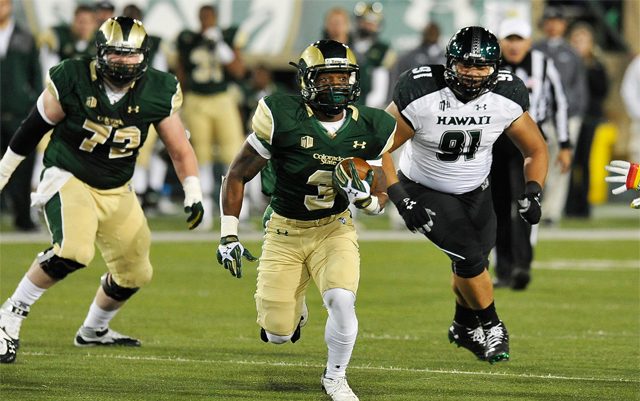Former NCAA football player Treyous Jarrells was secretly high in just about every game he played. While this is certainly not the crux of his message, it’s yet another instance that showcases the hypocrisy of putting players out on the field in a violent game, beating the snot out of each other – only to tell them how they should help their bodies feel better and heal after absorbing painful hit after painful hit. Jarrells earned a scholarship to Colorado State University and averaged a respectable 5.2 yards per carry as a sophomore in 2014. Two years later, he now has one of 102,620 medical cannabis licenses to legally grow plants in the state of Colorado. Jarrells joins the growing number of former American football players that think the NFL and NCAA should take medical cannabis off of the banned substance list.
In addition to his brief yet impressive rushing success, the speedy all-purpose back was a threat whenever he touched the ball, making an additional impact in CSU’s passing game, and especially returning kicks. NFL scouts were starting to notice him. Two more solid seasons at CSU and he could have been a millionaire professional. With little or no notice he quit the team, amid concerns of losing his scholarship for his personal choice of pain management.
“I practiced under the influence. I played games under the influence. This is my medicine,” Jarrells said in an interview with The Coloradoan. “I’ve seen players at CSU pop five, 10 ibuprofens before practice. Daily. You think that’s good? Over the course of two, three years, that’s eating your liver away.”
Jarrells uses medical cannabis to relieve chronic pain due to knee injuries he suffered playing football for 13 years, since the age of 10 when he first started playing Pop Warner in Florida. Remaining on NCAA fields would have meant two more years of punishing hits from defenders while playing at CSU, and then 5-7+ more years if he made it to the NFL. And today’s NFL usually features faster, stronger, harder-hitting defenders than that of its college counterparts. Jarrells decided he wasn’t having any more of it. Fearing he’d be expelled if he ever got caught, he left the Rams after playing in just one game as a junior.
Since then, the former speedster says he’s been making strides to grow both his plants and his cannabis business.
“These two semesters I wasn’t able to play ball, I was able to make connections for my career,” Jarrells continued. “If I would have played ball, I wouldn’t have had those opportunities because I wouldn’t have been in the places to make those connections.”
According to the story from The Coloradoan, Colorado State University ordered 19,000 over-the-counter ibuprofen, acetaminophen and naproxen for its roughly 400 student athletes, not to even mention any opioids. The NFL’s dependence on pharmaceutical pain relievers could be even worse, and an increasing number of current and former players are taking notice and speaking out. Despite that, NFL commissioner Roger Goodell told reporters during Super Bowl media day that the ban will remain. Goodell and his cronies routinely fine and suspend players for even the smallest substance policy violations, celebrations and uniform alterations. Worst commissioner ever?






